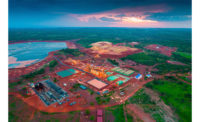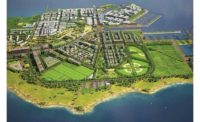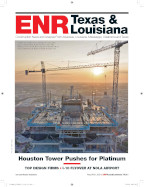International Green-Tech Firms Find Base in Texas
Texas developers unveiled an ambitious plan for a $2-billion combined green-technology business park and regional airport project near Austin. Supported by a generous tax rebate scheme, the project is aimed at attracting international anchor tenants and designed to demonstrate the best way to build a commercial development based on green principles.


Developers of the planned Eco-Merge Green Corporate Centers, a 1,500-plus-acre project about 15 minutes east of Austin, said at an Oct. 19 press conference the project grew out of a desire for green technology firms to locate at a shared site. The project is a partnership between central Texas developers Green Corporate Centers Holdings Inc. and Eco-Merge, a Japan-based consortium with a U.S. branch headquartered in Austin.
Eco-Merge officials told reporters the project already has signed four international green-tech tenants: Toshiba International Corp., Japan; EcoSolargy, China; Skash Ganga Pte. Ltd., India; and Yerico Manufacturing Inc., Korea. Those organizations that are “researching, creating, incubating and producing advanced green technologies wanted to showcase their expertise in one setting,” says T.R. Reid, spokesman for Eco-Merge. He says the project would also address a “woeful shortage” in the area’s general aviation capacity and create shared opportunity in the form of new jobs, tax revenue and investment from within and outside the region.
Reid says site construction for the campus could be under way by early next year and that the total build-out will take an estimated nine years. How construction work will be packaged and distributed is to be determined, he says. During peak build-out, the project could generate more than 3,000 full- and part-time construction and related jobs, according to a study by economist firm The Perryman Group, Waco, Texas.
The developers hope the campus will become a global showcase for energy efficiency, renewable power and sustainability in office, industrial and manufacturing facilities. Reid says this means infrastructure plans call for “unprecedented” energy efficiency through master community design, construction and operating practices, which aim to achieve or exceed the highest level of LEED standards, he says.
Reid adds that Eco-Serve hopes the campus will serve as a prototype for future centers as well as retrofits of existing sites.
The campus will feature an Internet protocol-based “micro grid” at its hub, led by Tiga Energy Services, Austin, to manage all energy generation, storage, transmission and consumption as well as provide voice, video and data services.
The airport will serve primarily small-business aircraft. An agreement with the Bastrop County Commissioners prohibits regularly scheduled passenger and cargo service.
The commissioners approved in June an incentive agreement that would refund to the developers 75% of the taxes generated by the campus over 30 years.
John Burns, president and CEO of Eco-Merge in Austin, says Bastrop County has an “extraordinary chance to make the area a leader in the global ecological revolution.” He adds that doing so will have “huge benefits for our [residents], our education system and our entire community.”




